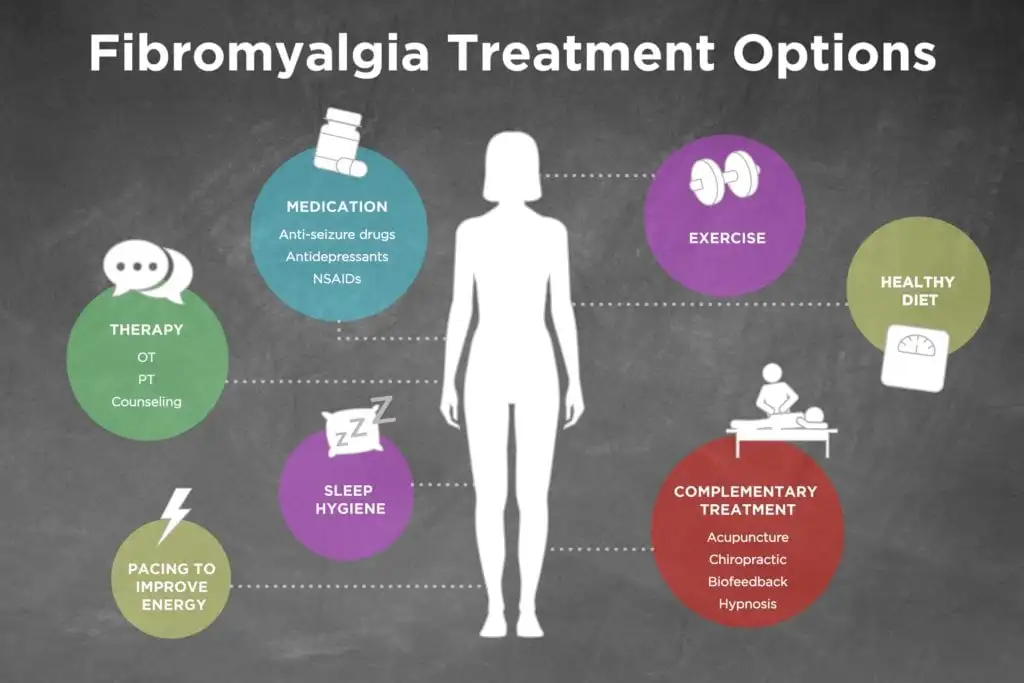Treatment for fibromyalgia in Western medicine is palliative. Once someone is diagnosed with fibromyalgia, the next step is finding a treatment plan to help manage symptoms. Treatment of fibromyalgia will often involve a combination of treatment options. It may take some time and experimentation, but relief from symptoms is possible if you find what works for you and stick with it.

A medical professional will be able to recommend the best treatment for fibromyalgia, but here are some of the most common treatments for fibromyalgia:
Therapy: an effective and safe treatment for fibromyalgia
Fibromyalgia is often treated with talk therapy and cognitive-behavioral therapy (CBT). These types of counseling help people with fibromyalgia learn how to cope with their condition and manage pain.
Medicines for fibromyalgia
Medicines for fibromyalgia help treat pain and even help with mood changes and difficulty sleeping. Here are some of the most popular groups of medicines for fibromyalgia that are used to treat fibromyalgia.
- Over-the-counter pain medications: This is one of the medicines for fibromyalgia for mild fibromyalgia pain; many over-the-counter painkillers can help. Advil (ibuprofen) and Tylenol (acetaminophen) are both examples of medications that can be purchased at any pharmacy. Pain medications may help you feel better, but they often work best as part of a multidimensional treatment plan for fibromyalgia.
- Antidepressants: Antidepressants are another group of medicines for fibromyalgia that work by increasing hormones like serotonin in the brain, which can help the central nervous system respond to pain better. Antidepressants can also help with mood changes and sleep problems that many people with fibromyalgia have. Cymbalta, Paxil, and Savella are commonly prescribed antidepressants.
- Anticonvulsants: Anticonvulsants, or anti-seizure medications, help keep nerves from sending too many pain signals to the brain. Lyrica (pregabalin) and Neurontin (gabapentin) are anti-seizure drugs approved by the FDA to treat fibromyalgia, but they can cause side effects like weight gain and blurred vision.

Meditations for fibromyalgia are particularly helpful with fibromyalgia symptoms as they can make you more aware of the present moment. Research shows that mindfulness may reduce fibromyalgia symptoms among women, including sleep problems and stress. Results show that people who practiced mindfulness experienced fewer severe symptoms and less burden linked to fibromyalgia. It can also be beneficial in reducing anxiety and stress, which are the most typical triggers of fibromyalgia.
However, as with any medication, there’s always the potential for side effects. Fibromyalgia medications may cause some of the following side effects:
Fibromyalgia medications can cause more severe side effects. Due to these side effects, more people are looking into natural treatments because they cause no side effects and have proven very effective.
What is fibromyalgia?
Fibromyalgia is a mysterious conglomeration of various and variable complaints linked together as a syndrome and was not recognized officially as a complaint until two or three decades ago. Therefore, the question of what fibromyalgia is did not arise until recent times.

Fibromyalgia is a long-lasting or chronic disorder that causes muscle pain and fatigue (feeling tired). If you have fibromyalgia, you have pain and tenderness throughout your body. Sometimes you may have two or more chronic pain conditions at the same time, such as:
- Chronic fatigue syndrome
- Irritable bowel syndrome
- Interstitial cystitis.
- Temporomandibular joint dysfunction (TMJ)
Fibromyalgia patients are susceptible to heat, light, and sometimes touch. Their skin feels tender, and they may feel the painful parts are inflamed, but there is no swelling. Poor concentration and extreme mood swings are other symptoms they might display. Usually, fibromyalgia affects women over 30, but even children and men are sometimes affected. There is no known cure for fibromyalgia. However, you can overcome this symptom over time with natural cures like herbs and dietary supplements that help with the condition.
Numerous musculoskeletal pains, as well as symptoms of memory loss, fatigue, mood swings, and sleep problems, are signs of the disorder fibromyalgia. Researchers believe that fibromyalgia intensifies your pain sensations by influencing how your brain handles pain signals.

Generally, symptoms start after significant psychological stress, infection, surgery, or physical trauma. For some patients, symptoms accumulate gradually over time with no particular triggering event.
It’s most prevalent among women, and people with fibromyalgia also suffer from depression, anxiety, irritable bowel syndrome, and headaches.
Symptoms often include cognitive difficulties, fatigue, and widespread pain. It can often co-exist with other conditions such as temporomandibular joint disorders, painful bladder syndrome or interstitial cystitis, headaches and migraines, and irritable bowel syndrome.
Sadly, there is no cure for fibromyalgia. However, various medications can aid in keeping the symptoms at bay and preventing them from reducing the quality of life. For a more natural approach, home remedies for fibromyalgia might be a more suitable option for some people.
Fibromyalgia causes
The precise causes of Fibromyalgia are unknown. However, current thinking in rheumatology suggests that fibromyalgia is a problem with central pain processing in the brain, where there may be an increased sensitivity or perception of pain to a given trigger.

Listed below are common fibromyalgia causes:
Genes
Fibromyalgia often runs in families. If you have a family member with this condition, you’re at higher risk of developing it.
Trauma
People who go through severe physical or emotional trauma may develop fibromyalgia. The condition has been linked to post-traumatic stress disorder (PTSD).
Stress
Like trauma, stress can have long-lasting effects on your body. Stress has been linked to hormonal changes that could contribute to fibromyalgia.
Other fibromyalgia causes are:
- A stressful, traumatic physical or emotional event, such as a car accident
- Repetitive injuries
- Rheumatoid arthritis or other autoimmune diseases, such as lupus
- Central nervous system (CNS) problems
- Fibromyalgia may also be hereditary. Females with a close relative with fibromyalgia have a higher risk of experiencing it.
The causes of fibromyalgia can also be linked to depression, trauma, overexertion, anxiety, lack of exercise, stress, humidity, lack of sleep or sleep disturbances, infectious diseases, and extremes of temperature. Yet none of these causes can be solely responsible for this condition.
Different researchers have given several theoretical explanations as to why some causes lead to the onset of fibromyalgia. Some theorists feel that the abnormal functioning of the immune system may cause this problem. They also feel that certain toxic substances from lactic acid accumulate in the muscles to cause this condition.
Viral infections have also been linked to the development of this disease in individuals. Several scientists claim that food allergies from food products such as fermented foods, eggplant, dairy products, wheat, and potatoes may also cause the disease.
Symptoms of fibromyalgia?

Widespread muscle pain, joint pain, fatigue, and poor sleep are the defining symptoms of fibromyalgia. The disease affects people differently. Listed below are common symptoms of fibromyalgia:
- Anxiety or depression.
- Digestive problems, including diarrhea or constipation,
- Face or jaw pain (temporomandibular disorders)
- Headaches or migraines.
- Memory problems.
- Tingling or numbness in the hands or feet
Symptoms of fibromyalgia in women

Fibromyalgia is more common in women than men, who may experience symptoms differently. For example, women tend to report higher pain levels and often have additional symptoms, such as heavy or painful menstruation.
The most common symptoms of fibromyalgia in women are:
- Fatigue in the morning
- Pain all over the body
- Symptoms are specific to irritable bowel syndrome, commonly known as IBS.
Natural remedies for fibromyalgia
Natural remedies for fibromyalgia are safe and effective. For people suffering from fibromyalgia, anti-seizure drugs, antidepressants, and painkillers are typically prescribed. They can be beneficial for lessening symptoms like insomnia, fatigue, and pain. However, for some people, these symptoms may not be the ideal approach. Studies show that conventional medications are sometimes ineffective in treating fibromyalgia. Additionally, they can lead to adverse effects that may further complicate the condition.

About 10 million people in the US are estimated to suffer from the disease. It’s primarily prevalent in women but can also affect men and children. If you’re opposed to the idea of side effects or want a more natural approach to fibromyalgia, natural treatments for fibromyalgia can be an excellent option.
Natural treatments for fibromyalgia
Natural treatment for fibromyalgia is one of the most demanding treatments for fibromyalgia without causing any side effects, and it is highly effective. Alternative therapies heal the whole being, which is why some fibromyalgia patients choose to treat their typical symptoms. Many alternative options can ease the pain associated with fibromyalgia, from acupuncture and biofeedback to herbal supplements and meditation. Alternative medicine is just one of the treatment options for fibromyalgia.

Listed below are different forms of natural treatment for fibromyalgia:
Home remedies for fibromyalgia
Home remedies for fibromyalgia are a group of natural remedies for fibromyalgia that are effective in the treatment of fibromyalgia.
If you want to try home remedies for fibromyalgia, various options may help reduce symptoms.



